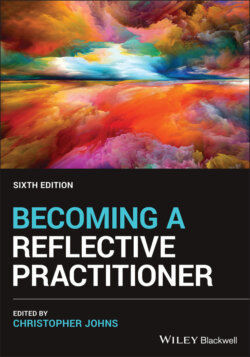Читать книгу Becoming a Reflective Practitioner - Группа авторов - Страница 67
The Value and Therapeutic Benefit of Writing
ОглавлениеWriting a story has great value (Table 3.1). It is cathartic and healing. Without a doubt, healthcare work is stressful, embracing suffering on a daily basis and working under conditions that do not necessarily facilitate caring work. As such, it seems imperative that practitioners have a mode for expressing and sharing their feelings.
TABLE 3.1 Value of Constructing Story
| Paints a rich descriptive canvass for reflection, |
| Focuses attention on one’s practice and recognising significance within the unfolding situation, |
| Develops perception, |
| Gives voice (see Chapter 7), |
| Enables self to become aware of self and others within the context of the practice environment/connection with self and with others (empathy), |
| Is cathartic/healing/transformative (see below), |
| Points to problems and contradictions with values, and |
| Others can relate to it because of its subjective and contextual nature. |
The subtitle of Rachel Remen’s (1996) book Kitchen Table Wisdom is ‘stories that heal’. She claims that in telling our stories we connect with something vital in us, something healing. She writes:
Whatever we have denied may stop us and dam the creative flow of our lives… avoiding pain, we may linger in the vicinity of our wounds… without reclaiming that which we have denied, we cannot know our wholeness or have our healing. (p. 70)
The reclaiming is in telling or writing the story. Writing is the creative flow of our lives. If we do this consistently then it washes away traumatic debris before it can accumulate into a dam. Then we have a crisis. Jourard (1971) argues that self‐disclosure of upsetting experiences serves as a basic human motive. As such, people naturally discuss daily and significant experiences with others. Talking through trauma with others can strengthen social bonds, provide coping information and emotional support, and hasten an understanding of the event; the inability to talk with others can be unhealthy.
In reviewing the therapeutic benefit of telling and writing experience, the work of Pennebaker’s (1990) book title – ‘Opening up the healing power of confiding in others’ tells his overall message – the idea of story as ‘opening up’. And in opening up, letting go of the tension within.
Pennebaker (1989, p. 213) writes:
When given the opportunity, people readily divulge their deepest and darkest secrets. Even though people report they have lived with these thoughts and feelings virtually every day, most note that they have actively held back from telling others about these fundamental parts of themselves. Over the past several years, my colleagues and I have learned that confronting traumatic experiences can have meaningful physiological and psychological benefit. Conversely, not confiding significant experiences is associated with increased disease rates, ruminations and other difficulties.
Pennebaker and his various colleagues (Pennebaker et al. 1990, 1997) demonstrated the therapeutic benefit of therapeutic journaling in well‐being, notably the benefit of connecting strong feelings to past traumatic events.1 Smyth et al.’s (1999) review of the literature suggested that emotional expression has a salutary health effect, whereas emotional inhibition has a detrimental health effect. Smyth cites Pennebaker et al.’s (1997, p. 175) claim that:
Written emotional expression leads to a transduction of the traumatic experience into a linguistic structure that promotes assimilation and understanding of the event, and reduces negative affect associated with thoughts of the event.
Smyth’s reviewed ten studies that demonstrated significant superior health outcomes in healthy participants; psychological well being, physiological functioning, general functioning, reported health outcomes, but not for health behaviours. Smyth noted that these studies demonstrated that short‐term distress was increased but is thought to be related to long‐term improvement.
Pennebaker et al. (1990, p. 536) write: ‘The present experiment, as well as others that we have conducted, found that writing about transition to college resulted in more negative moods and poorer psychological adjustment by the end of the first semester. Our experiment may have effectively stripped the normal defences away from the experimental subjects. With lowered defences, our subjects were forced to deal with many of their basic conflicts and fears about leaving home, changing roles, entering college’.
Indications from this study suggest that the power of confronting upsetting experiences reflects insight rather than cathartic processes. In follow‐up questionnaires, for example, the overwhelming majority of the subjects spontaneously wrote that the value of the experimental condition derived from their achieving a better understanding of their own thoughts, behaviours, and moods. The stripping away of defence mechanisms means that practitioners may benefit from guidance to support them through the consequences of the writing experience.
